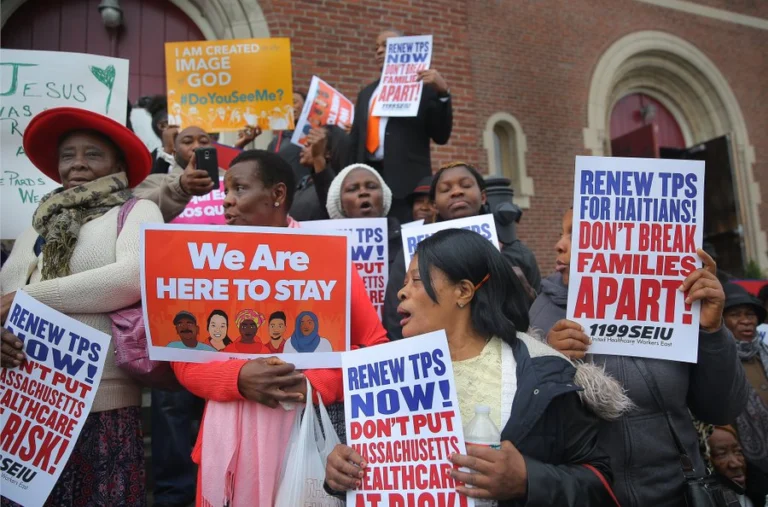Federal Judges Block Efforts to Eliminate TPS for Venezuelans and Haitians in the U.S.
Federal court rulings in California and New York have blocked attempts to end TPS for Venezuelans and Haitians, keeping the humanitarian protection in place while legal challenges proceed.

U.S. federal courts halted efforts to revoke TPS for Venezuelan and Haitian nationals, maintaining legal protection for over 800,000 migrants. Photo: @HaitianTimes_
July 2, 2025 Hour: 1:50 am
Federal judges in California and New York have blocked attempts by the Trump administration to end Temporary Protected Status (TPS) for over 800,000 migrants from Venezuela and Haiti, temporarily safeguarding them from deportation while legal proceedings unfold.
RELATED:
Venezuela Appeals to Pope Leo XIV for Intervention in Migrant Children Crisis in the U.S.
Temporary Protected Status (TPS), a humanitarian program that allows nationals from crisis-affected countries to live and work legally in the United States, has been upheld for migrants from Venezuela and Haiti following two key federal court rulings.
In California, Judge Edward Chen issued an injunction halting an order by Homeland Security Secretary Kristi Noem to revoke TPS for approximately 350,000 Venezuelans. The judge ruled that ending this protection would cause “irreparable harm” to its beneficiaries.
“The court finds that the secretary’s action threatens to cause irreparable harm to hundreds of thousands of people whose lives, families, and livelihoods would face severe disruption, cost the United States billions in economic activity, and endanger public health and safety across communities nationwide,” the ruling states.
Judge Chen also noted that the government failed to demonstrate that continuing TPS for Venezuelans would cause significant harm, and therefore lacked sufficient justification to end the program.
In a separate decision, Judge Brian Cogan in New York ruled that Secretary Noem “lacked the legal authority” to unilaterally alter Haiti’s TPS designation. Noem had reduced the extension granted under the Biden administration from 18 months to 12, moving the expiration date up from February 2026 to August 2025.
Cogan emphasized that ending the program early would bring “significant harm” to over 500,000 Haitians who depend on TPS for legal status and employment in the U.S.
Although the lawsuit was filed by nine Haitian nationals, the ruling may benefit all Haitian TPS recipients. Cogan cited the Administrative Procedure Act, which allows courts to block federal agency actions that exceed their legal limits.
Background and Context
TPS was established by the U.S. Congress in 1990 to provide temporary relief from deportation and work authorization to nationals from countries experiencing war, natural disasters, or other extraordinary conditions. While it offers essential humanitarian protection, TPS does not provide a path to permanent residency and must be extended or redesignated by the executive branch.
Venezuela received its TPS designation in March 2021 under the Biden administration, in response to the country’s ongoing political and economic crisis. In July 2023, the Department of Homeland Security extended that status for an additional 18 months.
Haiti has received multiple TPS designations since the 2010 earthquake, with subsequent extensions granted due to persistent political instability, gang violence, and humanitarian emergencies. In July 2024, the Biden administration extended Haiti’s designation through February 2026.
The National TPS Alliance, a coalition of beneficiaries and advocacy organizations formed in response to Trump’s 2018 efforts to end TPS for several countries, has played a central role in defending affected communities. Last week, the alliance filed emergency motions to halt the administration’s most recent efforts to eliminate TPS protections.
Regional and Human Impact
According to U.S. Citizenship and Immigration Services, more than 800,000 individuals from at least 15 countries—including El Salvador, Syria, Sudan, and Ukraine—are currently protected under TPS.
Both Haiti and Venezuela rely heavily on remittances sent by migrants living abroad. According to the World Bank, these financial flows represent a substantial share of each country’s GDP. Ending TPS protections could severely impact fragile economies and disrupt the lives of millions who depend on migrant income.
These court rulings offer a temporary reprieve for thousands of Venezuelan and Haitian migrants facing the threat of deportation. Still, the long-term future of TPS remains uncertain, with ongoing legal battles and evolving immigration policies continuing to shape the fate of vulnerable migrant communities across the United States.
Author: MK
Source: EFE






